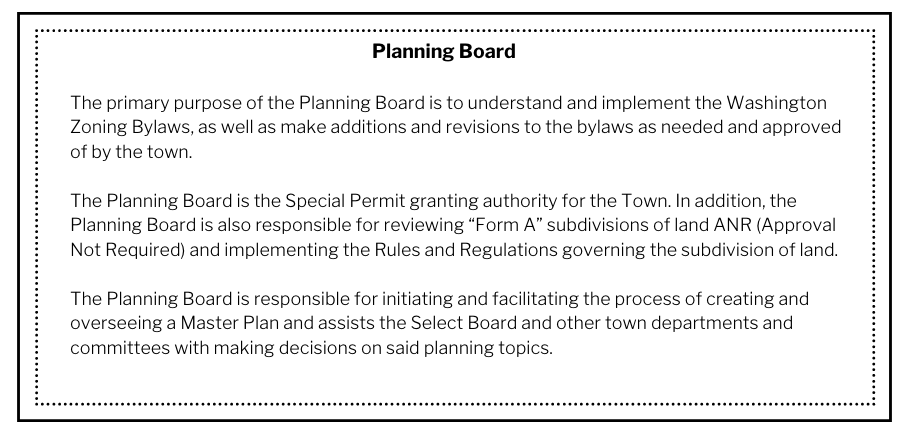Resident Profile: Don Gagnon, Planning Board Chair
Following Carol Lew’s article “The Running of our Town”, the Insight’s team thought an intermittent series of articles on individuals in town who have worked long and hard on the various committees would both honor their work and also give folks an idea of what community involvement looks like. This is the first of these articles.
A few minutes before seven pm on the second Tuesday of the month, Don Gagnon can be seen entering the Washington Town Hall with the quiet confidence of a man who keeps his own council. He takes his seat at the center of the conference table. After chatting with colleagues, he glances up at the wall clock, checks that a quorum of members are seated, and at seven he begins the monthly Planning Board meeting.
Don has had years of practice: 24 years on the Washington Zoning Board of Appeals, ten years on the Planning Board and five years as Planning Board chairman.
When the Gagnons moved to Washington in the early ’80s there were many young people here, many with young children. They formed a food co-op and many took on jobs in the community. Ed Bond, one of the group, asked Don to serve on the Zoning Board of Appeals, and so his years of service to Washington began.
“Sue and I are Berkshire natives,” Don says. “In 1977 we moved over the New York State line for Sue to get her MSW at SUNY Albany. When Sue finished her degree we were both working in Pittsfield. We were expecting our first child and wanted to move back — We wanted our children to be educated in the Central Berkshire System.”
The house that belonged to Dick and Eunice Hurley on Route 8, just south of Beach Road, was for sale and, according to Don, “It fit the bill.” The Hurleys owned the house and 50 acres from Route 8 all the way back to the railroad tracks. Two acres with the house were carved out and put up for sale. This was before Washington adopted four acre zoning.
Three years after the Gagnon’s moved in, Pittsfield Sand and Gravel bought the rest of the Hurley’s land. They immediately began large-scale gravel processing and the abutting neighbors were up in arms. The Washington Select Board and Planning Board took action. There was concern about the wetlands abutting the headwaters of the Housatonic River, as well as for the wells of the neighboring properties. Eventually, Don explained, the company was persuaded to redirect traffic out of the area via Bullard’s Crossing Road. The Planning Board developed an Earth Removal Bylaw to control the impacts on abutting properties and ground water. According to Don, the community rallied in support of the action.
It was a busy time to be on the ZBA. In 1986 the town was reviewing a residential minimum of four acre zoning. “The reasoning behind increasing the size of a building lot to four acres,” Don explains, “was based on the issue of well and septic separation and placement. The Planning Board noted that due to the ledge, wetlands and slope issues prominent in Washington, moving to a four acre minimum would improve housing development. It passed in 1987.” With these compelling issues, Don could not help but become interested in the planning for the town.
In 2009, when a seat opened up on the Planning Board, Don took out papers and decided to run. For ten years he worked as clerk for Marilyn Wiley. During that time, the Board adopted the Wireless Communication bylaw and also developed solar and wind-power bylaws. When Wiley resigned in 2019, Don became the Chair.
It was also in 2019 that Don retired from Crane Paper Company where he worked as Senior Supply Chain Manager for the Currency Division.
Work on The Town Plan was well underway when Don became Chair. Don credits Jim Hueber, longtime chairman of the Select Board, for launching work on the Town Plan and creating interest in the community. Don recalls that Jim applied for the grant to help finance the project, and worked to include the various board chairs and other residents in the process — with a boost from the Berkshire Regional Planning Commission.
“From my perspective it is vital getting feedback from the town.”And it is that vital feedback Don is counting on when the Planning Board and the Town Steering Committee take up the work of bringing all the Town’s bylaws up to date. The goal is to ensure that the wording of each bylaw reflects the original intent and takes the town’s current needs into account.
The project will take the next two years. We will all be called in to vote on the revisions and rewording. “It will give residents a sense of ownership,” Don hopes — “an understanding of what our town is about, where issues lie.”
Don foresees the next two years as an “opportunity to make changes that need to be made, molding the town as we go. Many of the group of us that formed in the ’80s have moved on. Our kids have grown. Now we have a new wave of residents who we hope will become engaged.”


